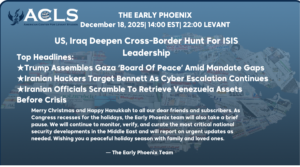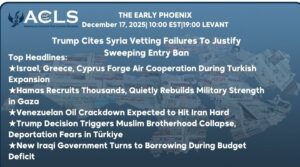TOP HEADLINES:
- Iranian Hardliners Reveal Alleged Secret Contacts with US Envoy Robert Malley, Raising Tensions
- Egyptian President Sisi Reiterates Backing for Palestinian Rights in Talks with President Abbas
- Israeli Institutional Investors Shift Over $8 Billion Abroad Amid Political Unrest and Sluggish Market Performance
- University Professor to Governor of Banque du Liban: Wassim Mansouri’s Remarkable Journey and Political Hurdles
- Iraq Grapples with Soaring Drug Crisis as Captagon Influx from Syria and Iran Surges
Turkiye
- Istanbul Sets Deadline for Syrians to Leave or Return to Registered Provinces (Hurriyet Daily News). Turkey’s Interior Ministry has issued an ultimatum to Syrians under temporary protection, giving them until September 24 to leave Istanbul if registered in other provinces. The move comes as authorities aim to address illegal migration and alleviate overpopulation in the city. Failure to comply with the deadline may result in law enforcement taking action to return Syrians to their registered provinces.
- Turkish Coast Guard Rescues 45 Irregular Migrants Pushed Back by Greece in Aegean Sea (Anadolu Agency). The Turkish Coast Guard rescued 45 irregular migrants from Afghanistan who were pushed back into Turkish waters by Greek authorities in the Aegean Sea. The migrants were found in a life raft off the coast of Ayvacik, Canakkale province, and were brought ashore and transferred to the Ayvacik migration office. Turkey and international rights groups criticize Greece’s illegal practice of pushing back migrants, stating it endangers vulnerable lives and violates humanitarian values and international law.
ISRAEL AND PALESTINIAN TERRITORIES
- Gaza Protests Demand End to Hamas Rule Amid Economic Hardship (Jerusalem Post). Thousands of Palestinians in Gaza protested against economic hardship, demanding an end to Hamas rule. The protests, triggered by high living costs and shortages of electricity and gas, saw some reports of Hamas security forces using force to disperse the demonstrators. While the protests are seen as a challenge to Hamas leaders, they don’t pose an immediate threat to their rule. Activists plan to resume the protests on Friday.
- Israeli Institutional Investors Transfer Over $8 Billion Abroad Amid Political Unrest and Market Underperformance (CTech). Israeli institutional investors have moved approximately $8.1 billion outside of Israel in the first half of 2023 amid ongoing political unrest and underperformance of the local stock market. Major insurance companies and investment funds are seeking higher returns abroad, anticipating a crisis in the Israeli stock market due to political instability and high-interest rates. Klirmark Capital has raised a record NIS 2.7 billion ($730 million) from local investors to support struggling companies and invest in the secondary market. Among the investors are Migdal Insurance, Clal Insurance, Meitav, Phoenix, Menora Mivtachim, Altshuler Shaham, and Amitim Pension Funds.
Egypt & North Africa
- International Recognition Withdrawn from Dabaiba’s Government; Inclusive Government Formation Underway in Libya (Libya Akhbar). Presidential Candidate Al-Bioudi Reveals Withdrawal of International Recognition from Dabaiba’s Government in Libya. UN Envoy’s Support for Two Councils’ Map Aims to Form Inclusive Government. Regional and International Developments Shaping Libya’s Next Stage with New Government Formation and Focus on Elections.
- Algerian Army Chief in Moscow to Bolster Military Cooperation with Russia Amid Growing Rapprochement (Al-Sharq Al-away). Algerian Army Chief of Staff, Lieutenant-General Said Chanegriha, is in Moscow to discuss strengthening cooperation between the People’s National Army and the Russian Armed Forces. The visit reflects a growing rapprochement in positions on international issues between Algeria and Russia. The two countries have historically strong relations in defense and military industries, with Algeria being a major importer of Russian weapons. The visit comes after agreements were signed during President Abdelmadjid Tebboune’s state visit to Russia in June, focusing on military industry, technology transfer, and space exploration. The enhanced cooperation has raised concerns among Western countries, particularly the United States.
- Egyptian President Sisi Reaffirms Support for Palestinian Rights in Meeting with President Abbas (English Ahram). Egyptian President Abdel Fattah El-Sisi met with Palestinian President Mahmoud Abbas in New Alamein to discuss the outcomes of the unity meeting of Palestinian factions hosted in Egypt. President Abbas expressed gratitude for Egypt’s historical support for the Palestinian cause. Both leaders discussed ways to resume the peace process for a two-state solution based on relevant UN resolutions and the Arab Peace Initiative. The meeting aimed to achieve comprehensive and just peace in the region with an independent Palestinian state on the 1967 border, with East Jerusalem as its capital.
GULF REGION & YEMEN
- OPEC Production Declines in July Amid Saudi Voluntary Cut (Al Khaleej). A Reuters survey revealed that OPEC’s oil production decreased in July due to Saudi Arabia’s additional voluntary cut as part of the latest OPEC+ agreement to support the market. OPEC pumped 27.34 million barrels daily in July, down 840,000 barrels from June. Saudi Arabia extended its voluntary production cut of one million barrels per day into August, with the possibility of further extensions. Additionally, Nigeria’s supplies were halted during this period.
- Jeddah to Host Peace Talks on Ukraine Crisis, Russia Excluded (Elaph). Jeddah will host peace talks on the Ukrainian crisis on August 5 and 6, with delegates from Western countries, Ukraine, India, Brazil, China, and South Africa attending, among representatives from 30 countries. The summit aims to garner support for the Ukrainian peace plan, but Russia will not be included. Saudi Arabia’s role in mediating between Russia and Ukraine is highlighted, while Russia expresses its willingness to negotiate, accusing Ukraine of refusing to participate. The summit’s success depends on developing peace principles adhering to UN Charter values. However, Ukraine’s demands face opposition from some developing nations.
- Over 5,600 African Migrants in Yemen Assisted by UN Organization to Safely Return Home (Yemen Monitor). The International Organization for Migration (IOM) has supported more than 5,600 African migrants stranded in Yemen to return to their home countries safely. Many of these migrants have been victims of trafficking, emphasizing the urgency of finding solutions to combat human trafficking. The IOM believes that voluntary, humanitarian return flights are the safest way for stranded migrants to return home and reports a significant increase in the number of migrants assisted this year compared to previous years.
IRAN
- Iranian Hardliners Exposed US Envoy Robert Malley’s Alleged Secret Contacts, Says Tehran Editor (Iran International). Iranian hardliners, known as the “merchants of sanctions,” are claimed to have exposed US envoy Robert Malley’s alleged secret negotiations with Iranian officials. Masih Mohajeri, an influential conservative newspaper editor in Tehran, accuses the hardliners of sabotaging the talks and interfering in domestic politics. Malley was suspended from his position as US envoy for Iran, and his security clearance is under investigation, but official details remain undisclosed, adding to the mystery surrounding the situation.
- IRGC to Reveal New Strategic Capabilities and Systems, Emphasizes Defense and Deterrence Priority (Mehr News). The Islamic Revolutionary Guard Corps (IRGC) is set to showcase its enhanced defense and deterrent power this year. Brigadier General Ramezan Sharif reaffirms the priority of protecting national security and peace and emphasizes unveiling new strategic capabilities in various forces and departments, including maritime defense. The preparations and qualifications of the IRGC and other armed forces are essential in guaranteeing deterrence and bolstering the country’s security.
- Iran Operates 45 Trade Centers Globally, Government to Increase Commerce Attaché in Embassies (IRNA). Iran has 45 trade centers established in various countries, which have been active in previous years but lacked sufficient support. Additionally, there are 20 commerce attaché in Iranian embassies abroad, and the government plans to double this number to 40. The administration of President Ebrahim Raisi aims to enhance support for the Iranian private sector’s trade potential.
- Iran Holds 4.9% Share of World’s Nanotechnology Articles, Ranks Fourth Globally (Tehran Times). Iran has secured the fourth position among the top 20 countries in nanotechnology, with 4.9% of the world’s nanotech articles published by Iranian scholars. The country’s nanotechnology sector has experienced significant growth and success, with a rising number of articles published and collaborations with other nations. Iran’s nanotechnology products have been exported to 49 countries, and efforts are being made to promote the application of nanotechnology with a ten-year plan focusing on various industrial areas.
- Iran Reaffirms Support for Syria’s Territorial Integrity and Strengthening Bilateral Cooperation (Mehr News). Iran’s Minister of Foreign Affairs, Hossein Amir-Abollahian, and his Syrian counterpart, Faisal Mekdad, discussed following up on agreements between their presidents during a joint press conference. They emphasized progress in implementing economic, commercial, and technological agreements and explored ways to boost cooperation between their private sectors. Iran condemned terrorist attacks in Syria and Pakistan, expressing support for the region’s peace, stability, and security. Both countries called for an end to foreign military presence in Syria and praised efforts to promote unity among Arabs and Muslims.
- Suspected Iran-Linked Plot to Attack Jewish Center Foiled in India (Iran International). Indian authorities recently detained two men in Pune for planning a series of bombings, including at the Chabad House Jewish Center in Mumbai. The suspects are believed to have ties to Iran’s Islamic Revolutionary Guard Corps (IRGC). The Chabad House was previously targeted in a deadly attack in 2008. Israel has warned of Iran’s continued attempts to target Israelis in various countries, and there have been previous terror attacks on Israeli and Jewish targets in India. The incident highlights concerns over Iran-affiliated agents organizing attacks in different regions to harm citizens of Jewish origin.
SYRIA
- Regional Normalization with Assad Fuels Catastrophic Crisis in Syria (Syria TV). The recent efforts by regional countries, such as Saudi Arabia, the UAE, and Jordan, to normalize relations with the Syrian regime led by Bashar al-Assad have resulted in severe consequences for Syria. The country faces an escalating drug trade with the production and distribution of Captagon, a surge in challenges for Syrian refugees to return home, and a collapsing economy. Additionally, diplomatic efforts to resolve the Syrian crisis have been hindered, leaving Syria uncertain, violent, and heightened geopolitical tensions. The ramifications of normalizing with Assad have proven disastrous, with the Syrian population bearing the brunt of these devastating consequences. Source: Foreign Policy.
- Iraq Faces Soaring Drug Crisis as Captagon Flows in from Syria and Iran (Orient). A report by Agence France-Presse reveals that Iraq has turned from a drug corridor to a drug-consuming country, with Captagon from Syria and crystal from Afghanistan and Iran being widely used. The influx of Captagon from Assad’s militia in Syria has led to its resale and consumption in Iraq, making many Iraqi youth addicted. Drug-related arrests have increased, with authorities seizing millions of Captagon pills and crystals. The drug epidemic has caused concerns, and rehabilitation centers are seeing an influx of addicts seeking help.
- Turkish Security Campaign Pushes Syrian Refugees Toward Risky Journeys to Europe (Enab Baladi). A recent security campaign by Turkish authorities targeting Syrian refugees, including “temporary protection” cardholders, has prompted many to seek ways to reach European Union countries. Amid rising tensions, Syrians are turning to smugglers to attempt dangerous journeys to Europe, facing risks of arrest, deportation, and drowning at sea. The crackdown has led to increased attempts at illegal immigration, as refugees aim to escape the difficulties of living in Turkey and seek a better life in Europe.
IRAQ
- Iraqi-Iranian Agreement Signals Independence in Political Decision, Raising Questions about US Sanctions Implications (Al Mustaqila). Iraq and Iran have reached an agreement that allows Iraq to send 250,000 barrels of oil per day to Iran in exchange for Iranian natural gas, despite US sanctions. The deal highlights Iraq’s pursuit of an independent political decision, as it circumvents US sanctions through a barter system. The Biden administration seeks further details about the agreement’s implications on sanctions, while observers suggest a long-term oil pipeline to consolidate relations and assert Iraq’s independence from American pressures.
LEBANON
- From University Professor to Governor of Banque du Liban: Wassim Mansouri’s Journey and Political Challenges (Al Sharq Al Awsat). Wissam Mansouri’s appointment as First Deputy Governor of Lebanon’s Central Bank faced uncertainties over the past three months, with calls for his resignation causing concerns about a critical vacancy in the institution. His background includes legal advisory roles to the Ministry of Finance and Parliament.
- Israeli Army Officials Warn: Likelihood of War with Hezbollah Highest Since 2006 (Al Jazeera). Amid protests over judicial legislation, concerns arise that Hezbollah’s leader, Hassan Nasrallah, may test Israel’s patience and exploit internal weaknesses. Prime Minister Benjamin Netanyahu discussed the growing tension with top security officials. While military intelligence believes Nasrallah is not seeking war, he might be ready to engage in conflict if necessary. The government’s push to change the judicial system has raised security consequences, weakening Israel’s deterrence against its enemies.



